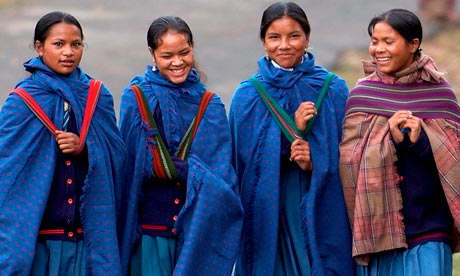The Khasi people of north-eastern India are a matrilineal society and some men aren't happy
By Julien Bouissou

The stronger sex ... girls on their way to school in Shillong, which has a strong matrilineal tradition. Photograph: Epa/Corbis
Kaith Pariat is sick of housekeeping and even more so of being bossed around by his mother-in-law. He has put up with this situation since he was married. "Can you imagine the shock of leaving your family home and suddenly becoming a dogsbody in your mother-in-law's house?" he asks. "She gives the orders and you become a good-for-nothing servant."
The Khasi, who number about 1 million in India's north-eastern state of Meghalaya, carry on the matrilineal tradition. The youngest daughter inherits, children take their mother's surname, and once married, men live in their mother-in-law's home.
"Only mothers or mother-in-laws look after the children. Men are not even entitled to take part in family gatherings. The husband is up against a whole clan of people: his wife, his mother-in-law and his children. So all he can do is play the guitar, sing, take to drink and die young," Pariat concludes gloomily.
Men are the weak sex in Meghalaya, but Pariat hopes the Syngkhong Rympei Thymai (SRT) campaign [roughly "a wedge to shore up a shaky table"] will promote reform of family structures. Indeed he wants to achieve more than mere equality. "Men are endowed with natural leadership. They should protect women, who in return should support them," he says.
According to Valentina Pakyntein, an anthropologist at Shillong University, the matrilineal system goes back to a time when Khasis had several partners and it was hard to determine the paternity of children. But SRT members have another explanation, claiming that their ancestors were away from home for too long fighting wars to be able to look after their families.
As members of an official ethnic minority, Khasis have many privileges: the Khasi Hills Autonomous District Council protects their laws, taxation is lower than elsewhere in India, land is set aside for their use in tribal zones, and a quota system operates for higher education and civil service jobs.
"Men from the plains, unscrupulous foreigners, marry Khasi women to take advantage of all these privileges," Pariat says scornfully. He claims such advantages jeopardise the future of the tribe. "But anyway it is the women who inherit and children take their name," says Patricia Mukhim, the editor of the Shillong Times. "I tend to think Khasi men feel diminished in their manhood compared with outsiders," she says. "It's a pity, because that's what distinguishes us from the others."
In the state capital Shillong, women wear skirts to church, put on lipstick and drive their cars with their windows open, listening to music. Many are happy to stay single. In a country where the pressure to get married is everywhere, they are an exception.
"Why bother with a husband? I already have a family and I want to concentrate on my career," says Rosanna Lyngdoh, 38, who lives with her extended family in a house with 21 bedrooms.
In India, where more than a third of women suffer domestic violence, the position of their Khasi sisters seems enviable. "Because we belong to a matrilineal society people think we're privileged, but it's not true," says Hasinah Kharbih, the head of the Impulse Network, adding that decisions by a woman must be endorsed by her maternal uncle.
The matrilineal system should not be confused with matriarchy. Khasi women have never held power. The former rulers of the tribe left their throne to the son of their youngest sister. All the chief government ministers are men and few women even sit on village councils.
But Pariat has no intention of giving up the struggle. He claims that the SRT has 1,000 members, many of whom are influential figures. They prefer to remain anonymous for fear of being ostracised by the community and their in-laws. The organisation even has some women members, mostly mothers from the neighbouring state of West Bengal. Pariat explains: "They are afraid their sons may be tempted by a Khasi woman and submit to their control."
This article originally appeared in Le Monde














